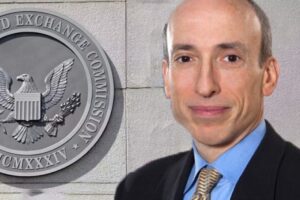
The Securities and Exchange Commission chairman, Gary Gensler, will step down from his position on January 20, 2025, the SEC announced on Thursday. The move will allow President Elect Trump to replace him at the start of his term. It had been widely expected that Trump would replace Gensler immediately.
Chair Gensler began his tenure on April 17, 2021, in the immediate aftermath of the GameStop market events. He led the agency through a busy rulemaking agenda including the adoption of new climate disclosure rules and other regulations. He also oversaw high-impact enforcement cases to hold wrongdoers accountable and return billions to harmed investors. The Gensler-led SEC also took a rigid stance in regulating cryptocurrencies, which is likely to soften under Trump’s appointee.
“The Securities and Exchange Commission is a remarkable agency,” said Chair Gensler in a statement. “The staff and the Commission are deeply mission-driven, focused on protecting investors, facilitating capital formation, and ensuring that the markets work for investors and issuers alike. The staff comprises true public servants. It has been an honor of a lifetime to serve with them on behalf of everyday Americans and ensure that our capital markets remain the best in the world.
“I thank President Biden for entrusting me with this incredible responsibility. The SEC has met our mission and enforced the law without fear or favor. I’ve greatly enjoyed working with my fellow Commissioners, Allison Herren Lee, Elad Roisman, Hester Peirce, Caroline Crenshaw, Mark Uyeda, and Jaime Lizárraga. I also thank Congress, my colleagues across the U.S. government, and fellow regulators around the world.”
Changes to Corporate Governance
To better promote trust in the capital markets, the SEC under Chair Gensler adopted a number of changes regarding corporate governance, including updating the rules for when corporate insiders can sell their shares, for when executives have to give back compensation based on erroneously reported financials, and for disclosure of executive pay versus performance. The agency also adopted new rules to allow shareholders to vote their preferred mix of board candidates on universal proxy cards in contested director elections. Additionally, the Commission adopted rules requiring more timely disclosure by those who are seeking control and buy more than a 5 percent stake in a company.
Disclosure Changes under Gensler
Since April 2021, the Commission has adopted several rules to require additional or enhanced disclosures from public companies and companies seeking to go public, broker-dealers, and investment advisors.
First, the Commission adopted rules to enhance disclosure around public company issuers’ cyber and climate risks, as well as for those companies seeking to go public via a special purpose acquisition company. The rules are grounded in materiality, as investors need this information to make buying, selling, holding, and voting decisions.
Second, the Commission adopted rules requiring certain broker-dealers and investment advisers to notify customers of data breaches that might put personal information at risk.
Finally, the Commission enhanced transparency to the markets by regularly publishing aggregate, anonymized data regarding registered investment funds, private funds, and investment advisers.
Accounting and Auditing Changes
During Chair Gensler’s tenure, the Public Company Accounting Oversight Board (PCAOB), overseen by the SEC, successfully negotiated a Statement of Protocol with Chinese market authorities to allow the PCAOB to fully inspect and investigate, for the first time, the auditors of China-related companies listed in the United States. For the last two years, the PCAOB has been able to fulfill its inspection and enforcement-related responsibilities as it relates to audit firms in China and Hong Kong.
Further, in April 2021, the PCAOB had only updated five of the standards it adopted on an interim basis when it was created 20 years ago. The interim standards had been carried over from existing American Institute of Certified Public Accountants standards, and the Sarbanes-Oxley Act envisioned that the PCAOB would update them soon after its creation. Since Chair Gensler was sworn in, the PCAOB has updated 18 interim standards and two other standards to reflect the current oversight needs in accounting and auditing.
It is unclear when Trump will announce a potential replacement for Gensler. No matter whom he appoints the next chair is expected to take a much softer approach to regulating the markets. ![]()
Joseph McCafferty is editor & publisher of Internal Audit 360°.

